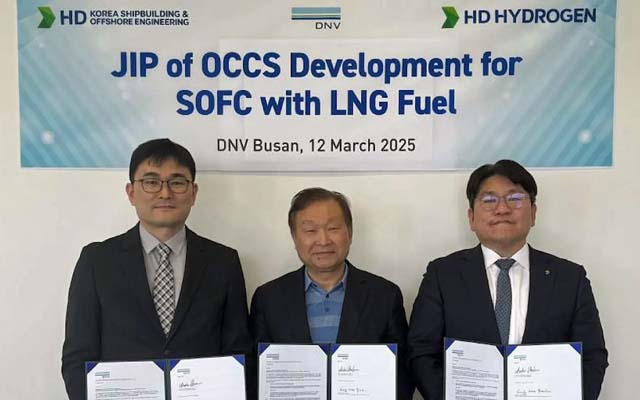HD Korea Shipbuilding and Offshore Engineering (HD KSOE), HD Hydrogen, and DNV have signed a Joint Industry Project (JIP) agreement to develop and validate Pressure Swing Adsorption (PSA) technology for carbon capture in Solid Oxide Fuel Cells (SOFC).
SOFCs are high-efficiency fuel cells that generate electricity using natural gas, ammonia, or hydrogen as fuel. As part of this agreement, HD KSOE and its subsidiary HD Hydrogen will explore the integration of PSA-based carbon capture technology into SOFCs for shipboard power generation. The ultimate goal is to replace conventional ship propulsion and power generation engines with SOFC systems, significantly reducing maritime carbon emissions. No significant technical obstacles are thought to hinder its implementation.
Seunghwan Oh, VP Business Development and Strategy, HD Hydrogen, said: “PSA technology is a key enabler in the era of Carbon Capture, Utilisation, and Storage (CCUS). Integrating this technology with SOFCs, one of the most efficient power generation systems available, can substantially contribute to maritime decarbonisation.”
Vidar Dolonen, Regional Manager DNV Korea and Japan, added: “The decarbonisation of shipping is a complex challenge, requiring a mix of solutions to bridge the transition to carbon-neutral fuels. Energy efficiency measures and onboard carbon capture technologies can play a crucial role in reducing emissions while the industry works towards securing reliable supplies of alternative fuels. This collaboration represents an important step in exploring practical and scalable carbon reduction strategies for the maritime sector.”
PSA technology selectively captures and releases CO2 by cyclically altering pressure within a capture chamber. This approach is expected to be at least 40% more energy-efficient than conventional CO2 absorption technologies used in marine applications.
Image: Joint industry project agreement between DNV, HD KSOE and HD Hydrogen (source: DNV)



